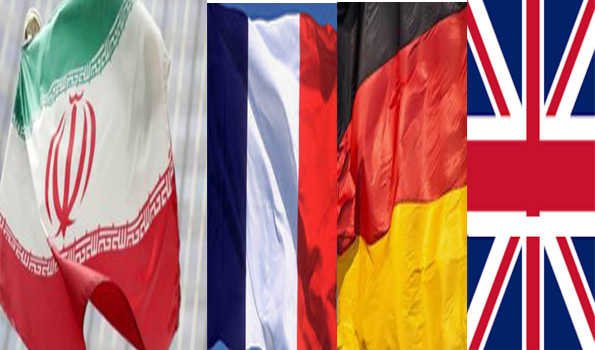Tel Aviv: Europe is awakening to the situation where Iran is “a step from the bomb”. An Israeli source said that Iran takes advantage of the situation in the US after the presidential elections and the “closed eyes of Europe”. But in recent days, there are some changes in Europe considering this fast evolving threat.
According to a report in Iran International, the website operated from London by the opposition to the regime in Tehran, Iran faces the threat of tougher sanctions as Britain, France, and Germany warn of a potential “snapback” of a 2015 UN resolution set to expire in October, aiming to prevent Tehran from achieving nuclear weapon capability by next year.
Iran has ramped up enrichment of uranium to up to 60% purity, edging closer to the 90% needed to be weapons grade, according to the UN nuclear watchdog chief, Rafael Grossi.
If successful, a “snap back” by the group known as the E3, would force Iran to suspend all nuclear enrichment-related and reprocessing activities, including research and development, and ban imports of anything that could contribute to those activities or developing nuclear arms delivery systems.
“Iran must deescalate its nuclear program to create the political environment conducive to meaningful progress and a negotiated solution,” the UN ambassadors of Britain, Germany and France wrote in a December 6 letter to the Security Council.
“We reiterate our determination to use all diplomatic tools to prevent Iran from acquiring a nuclear weapon, including using snap back if necessary,” they said.
According to the website, earlier this year, Grossi warned Iran is “weeks not months” away from a nuclear weapon.
A “snap back” would also see a conventional arms embargo reimposed, banning Iran from developing ballistic missiles capable of delivering nuclear weapons and revive targeted sanctions on dozens of individuals and entities. Iranian shipments would also be more heavily scrutinised globally with threats of cargo being seized.
“As the diplomatic crisis deepened, European and Iranian diplomats met late last month to discuss whether they can work to defuse regional tensions, including over Tehran’s nuclear program, before Donald Trump’s return to the White House, which promises a “maximum pressure” stance on Iran,” the report mentions.
The E3 has intensified its pressure on Iran following the Russian war in Ukraine, as Tehran’s military support for Russia has prompted additional sanctions from the international community.
Iran’s ally Russia criticised the E3’s actions, with UN Ambassador Vassily Nebenzia asserting on December 10 that Britain, Germany, and France had no authority to invoke the “snapback” of sanctions. He described their suggestion of potentially using the “snapback” mechanism as both unjustified and irresponsible.
In his biannual report to the UN Security Council on the implementation of the 2015 nuclear deal, known as the JCPOA, Antonio Guterres, the UN Secretary General, warned of a “critical need for a peaceful solution to the Iranian nuclear issue” while conflict and instability continues across the Middle East.
During his first term, Trump quit the nuclear deal in 2018, and now, threatens to toughen down further.
But as mentioned before, Tehran is using the time until Trump is back in the White house to get more enriched Uranium.
-The writer is an Israel-based freelance journalist. The views expressed are of the writer and do not necessarily reflect the views of Raksha Anirveda










